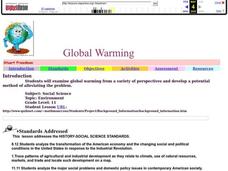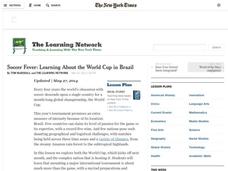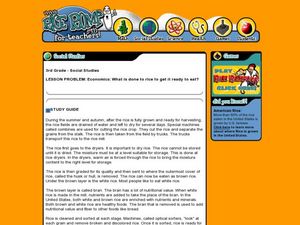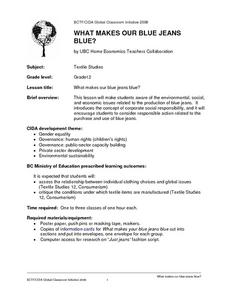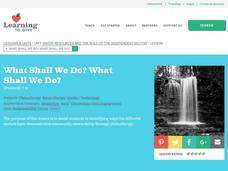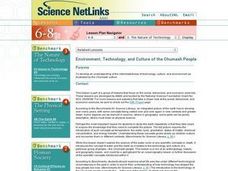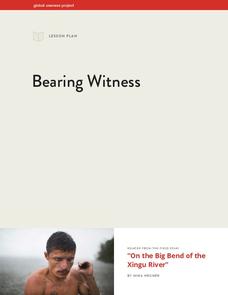Curated OER
Global Environmental Issues: Air and Water Pollution
Thinking about designing a project for your social studies or environmental science classes? Use an overview of a project that prompts class groups to research an environmental issue.
Earth Day Network
The Neolithic Revolution
With the abundance of food products we can easily access in our society today, it is easy to forget the toll this can take on our global environment. Young learners will discover how the transition to agriculture and domesticated living...
Curated OER
Social Studies and Economics
Students investigate the products agriculture provides in raw materials. In this agriculture products lesson, students make a list of common items used and foods eaten. Students work in teams to categorize agriculture products based on...
Curated OER
Global Warming
A series of independent learning activities teaches learners about global warming as it relates to economics and industrialization. The culminating project requires them to create a multimedia presentation identifying the problems,...
The New York Times
Soccer Fever: Learning About the World Cup in Brazil
What an incredible collection of ideas for teaching about the 2014 World Cup in Brazil! This resource is packed with news articles and instructional activities on a wide variety of topics, from the global popularity of soccer and the...
Gobal Oneness Project
Passionate Pursuits
Not all technology is digital. Teach learners about the low-tech maker movement with a photo essay about six artisans from California and two articles about the local creator movement. After tackling the photo essay in small groups,...
Curated OER
How does Paper Making Contribute to Economics
Second graders investigate the numerous jobs it takes to create paper in the U.S. In this economics lesson, 2nd graders discuss where paper comes from, what types of trees are needed, and how the paper milling process creates jobs and...
Redefining Progress
Have and Have-Not
Is there a correlation between a country's wealth and the extent of its ecological footprint? What exactly constitutes an ecological footprint, and how does one country stack up against the rest? This is a unique lesson to incorporate...
Curated OER
Economics: What Are Some Other Uses for Rice?
Sixth graders investigate ways rice is sold by creating a chart of the different rice foods. In this economics lesson, 6th graders examine their local food store and list at least 10 rice by-products in a class chart. Students discover...
Curated OER
What is Economics? An Economic Board Game
Learners learn the fundamental concepts of economics as it relates to government.
Curated OER
Economics: What is done to rice to get it ready to eat?
Third graders create a map showing the journey of rice from the field to the grocery store. In this agriculture lesson, 3rd graders discover and map the process of harvesting and preparing rice to be packaged and shipped to sell to...
Curated OER
Solar Energy in New York
Middle schoolers examine a variety of information for New York State including insolation data, and economic or political data, thus incorporating both science and social studies. Encouraging learners to become concerned citizens as they...
Curated OER
WHAT MAKES OUR BLUE JEANS BLUE?
Twelfth graders become aware of the environmental, social and economic issues related to the production of blue jeans. They explore the relationship between individual clothing choices as well as global issues. In addition, they...
Curated OER
Changing Planet: Infectious Diseases Classroom Activity
Here is a different approach: emerging epidemiologists first go home to interview family on the topic of infectious disease. Then they come to class and view a video and PowerPoint that explore how climate change may increase the...
Curated OER
Turning the Tide on Trash: Marine Debris Curriculum
Six different lessons comprise this unit on marine debris. Science, language arts, social studies, and art projects make this an ideal interdisciplinary unit. The result will be well-informed future citizens who can help make a...
Curated OER
Net Results
Young scholars investigate through role play how decisions by watermen, recreational fisherpeople, and lawmakers influence and are influenced by economics and the abundance or scarcity of fish and shellfish stocks. They consider social,...
Orange County Water Atlas
Location, Location, Location…
Young geographers discover not only how to read and recognize coordinates on a map, but also gain a deeper understanding of latitude and longitude and how climate changes can vary significantly across latitudes.
Curated OER
Economics
Fourth graders read a poem about rice and identify its importance around the world. In this rice lesson plan, 4th graders read about the role of rice in various nutritional sectors around the world. Students complete two word problems...
Curated OER
Water Resources and the Role of the Independent Sector
Students explore how water conservation is influenced by the four sectors of economy. In this social studies economics lesson, students brainstorm problems and solutions related to water conservation. Collages are created to represent...
Curated OER
Environment, Technology, and Culture of the Chumash People
Students develop an understanding of the interrelatedness of technology, culture, and environment as illustrated by the Chumash culture. They research the tribe and complete a table for the Chumash people describing their environment,...
Global Oneness Project
Bearing Witness
A controversial construction project in South America, the Belo Monte dam, is endangering local cultures, ecosystems, and communities. High schoolers create a concept map based on an online article they read before engaging in discussion...
Curated OER
How Much is Dirt Worth?
Dirt is worthless, isn't it? Find out the true value of dirt, and by dirt I mean soil. The class explores what makes soil, the types of soil, and what happens when soil becomes void of its nutrients. There are several great activities,...
Foreign Policy Association
Public Diplomacy Online Lesson Plan
To build an understanding that there are many perspectives of global issues and that an individual's perspective is influenced by background and experience, class members assume the identity of a person in the global community and...
Population Connection
The Peopling of Our Planet
How many people live on the planet, anyway? The first resource in a six-part series covers the topic of the world population. Scholars work in groups to conduct research and make population posters after learning about the global...





